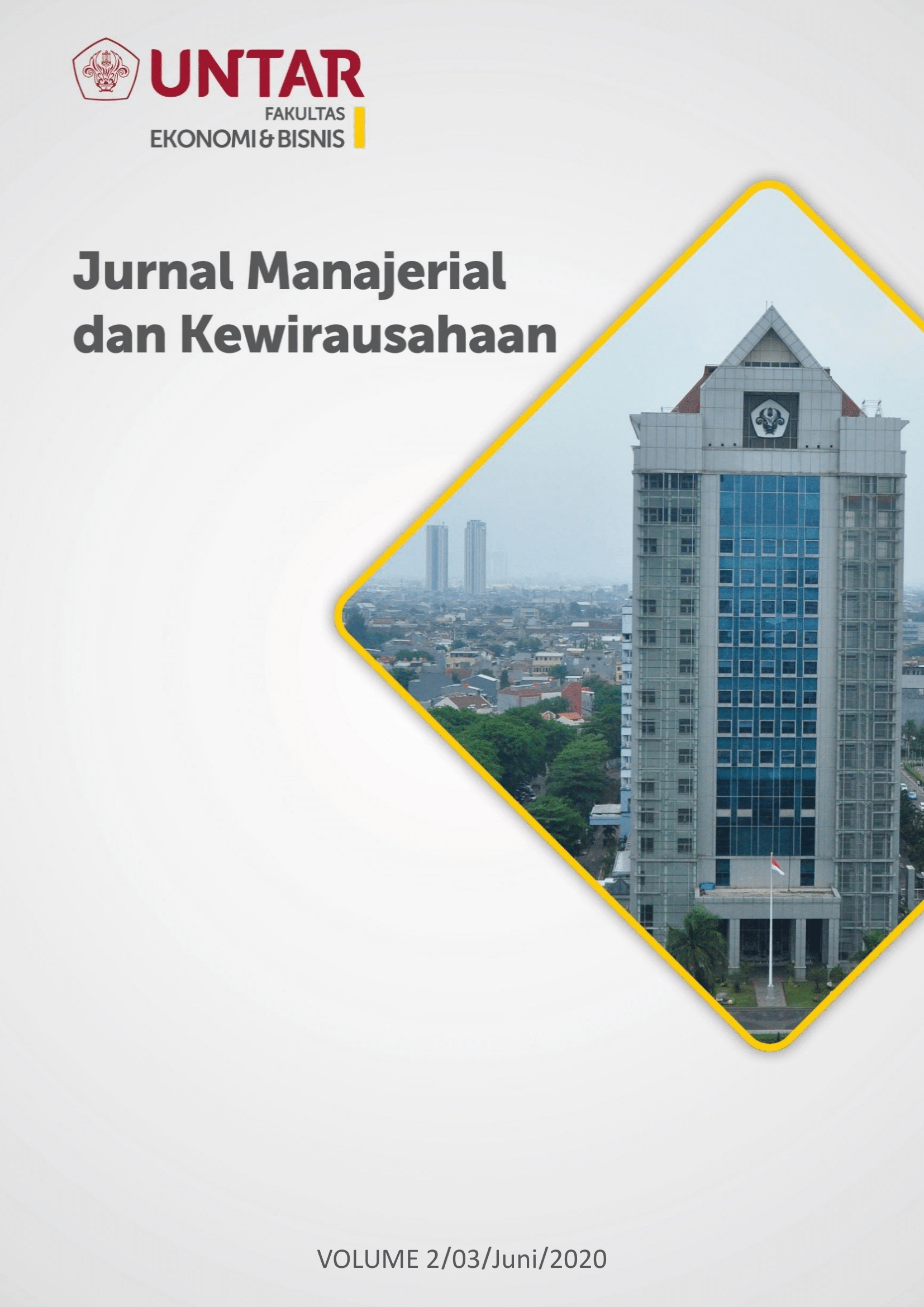Faktor yang Menentukan Penggunaan Financial Technology Secara Berkelanjutan pada Pengguna Ovo di Jakarta Barat
Main Article Content
Abstract
The purpose of this study is to find out whether 1) economic benefit can affect fintech continuance intention; 2) convenience can affect fintech continuance intention; 3) trust can affect fintech continuance intention ; 4) attitude can affect fintech continuance intention. This study uses the OVO users at West Jakarta as many as 156 respondents and analyzed with SmartPLS 3.2.8. Those samples are collected with google form and use purposive sampling method. The results of this study indicate that economic benefit, convenience, trust, and attitude can affect fintech continuance intention and all of these variable have positive relationship toward fitech continuance intention.
Tujuan dari penelitian ini adalah untuk mengetahui apakah 1) economic benefit memiliki pengaruh yang signifikan terhadap fintech continuance intention; 2) convenience memiliki pengaruh yang signifikan terhadap fintech continuance intention; 3) trust memiliki pengaruh yang signifikan terhadap fintech continuance intetion; 4) attitude memiliki pengaruh yang signifikan terhadap fintech continuance intention. Penelitian ini menggunakan sampel yaitu pengguna OVO di Jakarta Barat sebanyak 156 responden dan dianalisa dengan SmartPLS 3.2.8. Sampel diperoleh melalui google form dan pemilihan sampel yang digunakan adalah teknik purposive sampling. Hasil penelitian ini menunjukkan bahwa economic benefit, convenience, trust, dan attitude memiliki pengaruh yang signifikan terhadap fintech continuance intention dan seluruh variabel tersebut memiliki hubungan yang positif terhadap fintech continuance intention.
Article Details
Section
This work is licensed under a Jurnal Muara Ilmu Ekonomi dan Bisnis Creative Commons Attribution-ShareAlike 4.0 International License.,/p>
References
Ajzen, I. (1991). The theory of planned behavior. Organizational Behavior and Human Decision Processes, 50(2), 179–211.
Azizah, N., Putu, W, H., and Fatimah, A. (2018). Factors Influencing Continuance Usage of Mobile Wallets in Indonesia, 2018 International Conference on Information Management and Technology (ICIMTech), IEEE, 92-97.
Cao, X., Yu, L., Liu, Z., Gong, M., & Adeel, L. (2018). Understanding mobile payment users’ continuance intention: a trust transfer perspective. Internet Research, 28(2), 456–476.
Hair, J. F., Ringle, C. M., & Sarstedt, M. (2011). PLS-SEM: Indeed a Silver Bullet. Journal of Marketing Theory and Practice, 19(2), 139–152.
Indrawati, dan Dianty A. P. (2018). Analyzing Factors Influencing Continuance Intention of E-Payment Adoption Using Modified UTAUT 2 Model. 6th International Conference on Information and Communication Technology (ICoICT), 160-173.
José Liébana-Cabanillas, F., Sánchez-Fernández, J., & Muñoz-Leiva, F. (2014). Role of gender on acceptance of mobile payment. Industrial Management & Data Systems, 114(2), 220–240.
Joyosumarto, Subarjo. (2018). BANKIR Kepemimpinan Lembaga Perbankan Abad ke-21. Jakarta: Elex Media Komputindo.
Kim, C., Mirsobit, M., In, L. (2010). An empirical examination of factors influencing the intention to use mobile payment. Computers in Human Behavior 26, 310-322.
Koloseni, D., Herman, M. (2017). Why mobile money users keep increasing? Investigating the continuance usage of mobile money service in Tanzania, Journal of International Technology and Information Management, 26(2), 117-143.
Kolsaker, A., & Payne, C. (2002). Engendering trust in e? commerce: a study of gender? based concerns. Marketing Intelligence & Planning, 20(4), 206–214.
Lee, Ming-Chi (2009). Factors influencing the adoption of internet banking: An integration of TAM and TPB with perceived risk and perceived benefit. Electronic Commerce Research and Applications, 8(2009), 130-141.
Madden, T. J., Ellen, P. S., & Ajzen, I. (1992). A Comparison of the Theory of Planned Behavior and the Theory of Reasoned Action. Personality and Social Psychology Bulletin, 18(1), 3–9.
Okazaki, Shintaro, & Felipe Mendez. (2013). Exploring convenience in mobile commerce: Moderating effects of gender. Computers in Human Behavior, 29, 1234–1242.
Praveena, K., and Sam Thomas. (2014). Continuance intention to use Facebook: A study of perceived enjoyment and TAM. Bonfring International Journal of Industrial Engineering and Management Science 4(1), 24-29.
Ryu, Hyu-Sun (2018) What Makes Users Willing or Hesistant To Use Fintech?: The Moderating Effect of User Type. Industrial management & Data Systems, 118(3), 541-569.
Susanto, A., Younghunn, C., & Youngwook, C. (2016). Determinants of continuance intention to use the smartphone banking services, Industrial Management & Data Systems, 116(3), 508–525.

